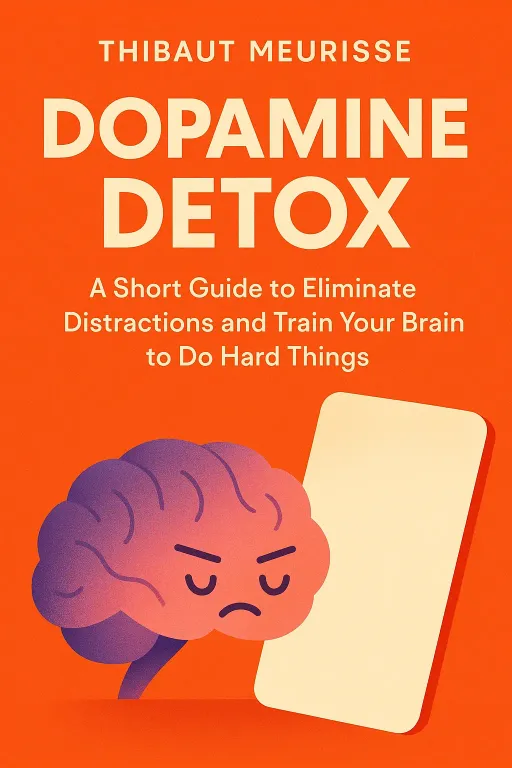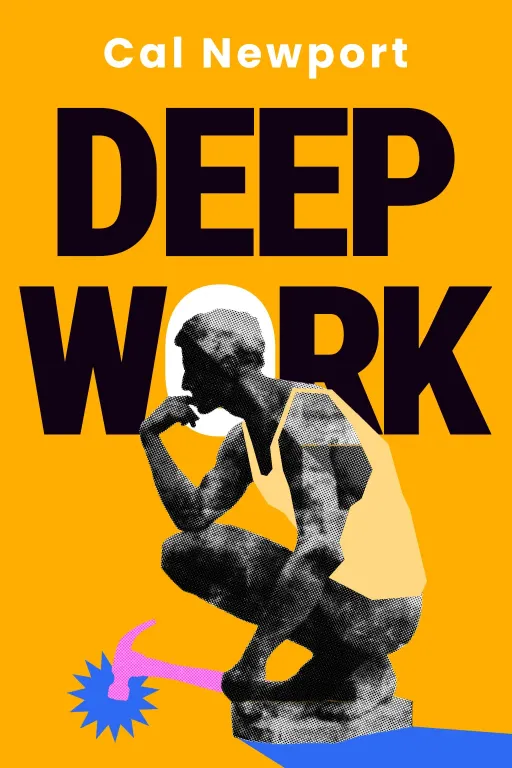
Dopamine Detox
10 minA Short Guide to Eliminate Distractions and Train Your Brain to Do Hard Things
Introduction
Narrator: It’s a familiar scene. A person wakes up, knowing a crucial, career-defining task awaits them. But before they can begin, they decide to just quickly check their email. That leads to a glance at their stock portfolio, which then morphs into an endless scroll through social media. Hours pass. The important task now looms larger, more intimidating than before. The author Thibaut Meurisse describes this feeling perfectly, writing, “It’s as though an invisible mental barrier had appeared between you and your task, and this barrier seems impossible to overcome.” This cycle of distraction, procrastination, and guilt is a hallmark of modern life.
In his book, Dopamine Detox: A Short Guide to Eliminate Distractions and Train Your Brain to Do Hard Things, Meurisse argues that this isn't a personal failing of willpower, but a biological response to an overstimulating world. The book provides a clear diagnosis of why we feel so distracted and offers a practical, step-by-step method to reclaim our focus, reset our brains, and finally tackle the hard things that matter.
Dopamine Is the Molecule of More, Not Pleasure
Key Insight 1
Narrator: A common misconception is that dopamine is the "pleasure chemical." Meurisse clarifies that this isn't accurate. Dopamine is not released when we experience pleasure, but in anticipation of a reward. It's the neurotransmitter of motivation, the internal driver that pushes us to seek out things our brain believes are essential for survival, like food or social connection. It’s the chemical that says, "Go get that! It will be good for you."
The problem is that this system creates a perpetual desire for more. Once the reward is obtained, the dopamine rush subsides, often leaving a sense of emptiness and a craving for the next hit. This creates a dangerous loop. We scroll social media, eat sugary snacks, or watch endless videos, constantly chasing the anticipation of a reward that never brings lasting fulfillment. Meurisse states, “The truth is that no amount of stimulation will ever bring you the sense of fulfillment you’re seeking.” In this state of constant, low-grade stimulation, any task that requires deep, sustained concentration feels impossibly dull and difficult by comparison, leading directly to procrastination.
Your Brain Is Being Intentionally Hijacked
Key Insight 2
Narrator: The modern world has become a battleground for our attention, and our dopamine system is the primary target. Social media companies, food manufacturers, and marketers have become experts at exploiting this biological mechanism. They design their products to trigger constant dopamine release, ensuring we stay hooked.
Meurisse shares a personal story of getting caught in a YouTube loop. He intended to watch a single basketball video but found himself pulled in by the platform's sophisticated algorithm, which kept recommending another, and then another. Hours were lost in a passive, unproductive state. This isn't an accident; it's a business model. Former Facebook executive Chamath Palihapitiya has openly stated that these apps are designed to "wire your brain for super-fast feedback," destroying our patience and capacity for long-term thinking.
The book points to the profound irony in the story of Steve Jobs, the man who put iPhones and iPads into millions of hands. A journalist once asked him if his children loved the iPad. Jobs’s reply was startling: his children had never used one. He, like many other Silicon Valley executives, strictly limited his own family’s exposure to the very technology he sold to the world. They understood its addictive power and its potential to erode the ability to focus and think deeply—the very skills necessary for real success.
The Detox Is a Reset, Not a Punishment
Key Insight 3
Narrator: If the problem is overstimulation, the solution is to intentionally reduce it. This is the core principle of the dopamine detox. It’s not about punishing oneself or eliminating all joy from life. Instead, it’s about lowering the brain's baseline level of stimulation so that normal, productive activities become appealing again.
Meurisse outlines three levels of detox. The most intense is the 48-hour complete detox, where an individual eliminates nearly all external stimulation—no internet, no phone, no music, no processed foods, no exercise. The goal is to engage only in calming activities like journaling, meditation, or contemplative walks. For those not ready for such a commitment, there is a 24-hour version or a "partial detox," which involves identifying and eliminating just the single biggest source of distraction for a set period.
To illustrate the power of radical disconnection, the book references the experience of the author's friend, Nils, who attended a 10-day silent Vipassana meditation retreat. For ten days, there was no talking, no eye contact, no phones, no reading, and no writing—only hours of silent meditation. While initially grueling, Nils reported emerging from the experience feeling profoundly calm, focused, and more aware of his own mind than ever before. This extreme example shows the potential for a mental reset when the constant noise of the world is finally turned off.
Engineer Your Environment for Success
Key Insight 4
Narrator: Willpower is a finite resource, but our environment is a constant influence. Meurisse argues that the most effective way to change behavior is to engineer one's surroundings to make good habits easy and bad habits difficult. The key concept is "friction."
He provides a compelling personal example of adding friction to an unwanted behavior. To combat his own excessive internet usage, the author physically moved his internet modem to a separate storage room in his building. To get online, he would have to leave his apartment, take an elevator down four floors, and unlock four different doors. The sheer effort involved was enough to deter him from mindlessly surfing the web. As he puts it, "Generally speaking, the harder something is to access, the less likely you are to do it and vice-versa."
The opposite is also true. To build a consistent writing habit, he reduced friction by creating a frictionless morning routine. The night before, he would leave his word processor open on his computer. In the morning, he would avoid his phone, play relaxing music, and immediately start a 45-minute timer for a writing session. By removing all the small barriers to starting, he made it easier to begin his most important task before distractions could take hold.
Build a Sustainable System to Avoid Relapse
Key Insight 5
Narrator: A dopamine detox can provide a powerful reset, but its effects will fade if one returns to old habits. The final, crucial part of the process is building a sustainable system to protect one's focus long-term. This begins with self-awareness—recognizing the moment you start to feel overstimulated and consciously choosing to step back.
Meurisse stresses the importance of having a contingency plan. The world is designed to grab your attention. Anticipate the triggers—the morning phone check, the notification buzz, the feeling of boredom—and decide in advance how you will respond. The book also advises cultivating "here-and-now" neurotransmitters like serotonin and endorphins to balance out the dopamine-driven chase. This can be achieved through activities that promote presence and genuine connection, such as meditation, deep social interactions, mindfulness, or even simply allowing oneself to be bored without reaching for a device. By building a simple, repeatable daily routine and having a plan for when things go wrong, it becomes possible to maintain focus in a world of endless distraction.
Conclusion
Narrator: The single most important takeaway from Dopamine Detox is that focus is not an innate trait but a deliberate choice and a cultivated skill. In an attention economy designed to hijack our brains for profit, passively hoping for focus is a losing strategy. We must actively and intentionally take control of our environment and our attention.
The book challenges us to look beyond the fleeting rush of excitement offered by a notification or a new video and instead seek deep, lasting fulfillment. This comes from immersing ourselves in challenging work, meaningful hobbies, and genuine human connection. The ultimate question it leaves us with is a profound one: Are you consciously building a life of purpose and productivity, or are you allowing your focus—and your potential—to be auctioned off to the highest bidder? The choice is yours to make, starting with your very next action.









